China’s Zero COVID Policy & Protests
Dear Reader,
We hope you are doing well. The protests in China against the zero-COVID policy have captured global attention. In this edition, we bring to you our perspective on the happenings in China and the future of its COVID strategy. We top it off with some insights into how India should govern Big Tech and why military leaders should speak with caution.
China’s Zero COVID Policy & Protests
Last week, protests erupted in multiple cities in China against the strict zero-COVID policy imposed by the Chinese government. Despite popular perceptions, protests are not uncommon in China. However, this time the protests appear to be targeted at the national level authorities, as opposed to the local ones alone, and they spread rapidly across the country, giving it a national character.
In our latest Takshashila Issue Brief - China's Zero COVID Policy and Protests, we analyse China’s COVID strategy, the political significance of the zero-COVID policy, and the future implications of the protests.
Explained: China’s COVID Protests & What They Mean For Xi Jinping
Manoj Kewalramani appeared in The Scroll’s Explained with Smitha Nair to discuss the protests happening in China:
According to Manoj:
There has been some speculation that these protests are happening because there is an element of permissiveness from different factions within the party, or different factions at different levels of different (local) governments … But my sense is that while Xi Jinping has detractors, the political cost of taking a position against him is too high and therefore you are unlikely to see any significant pushback within the ecosystem of the party today. Five years from now? Perhaps. At present? Highly unlikely.
What Unrest and Anger in China’s Cities Reveal
In an opinion for the Hindustan Times, Manoj Kewalramani writes on the the Chinese State’s response to the popular protests against its coercive COVID policies:
In managing this, the Chinese State appears to be deploying a mix of coercive and accommodative approaches. The former ranges from intimidation of protesters to limiting the flow of information that can fuel anger and mobilise people. The latter revolves around public messaging related to the virus and vaccination and operational tweaks to how the zero-Covid policy is implemented. Whether this can be sustained amid a spike in cases and, potentially, deaths among vulnerable populations is worth watching. For the moment, a smooth and orderly exit from zero-Covid appears unlikely.
Also, listen to this episode of All Things Policy where Manoj Kewalramani, joined by Pranav Satyanath, dissect the ongoing protests:
How Should India Govern Big Tech? Nitin Pai Answers
In an interview with BQ Prime on the sidelines of the Law, Economics and Policy Conference at FLAME University, Pune, Nitin Pai (Director, Takshashila) makes the case for India to not formulate policies in isolation and instead, work in tandem with its economic allies and make regulations interoperable:
Indian Military Leaders Should Speak with Caution
In the context of the recent media debates on India retaking Pakistan Occupied Kashmir (PoK), Lt. Gen. Prakash Menon writes in The Print on the need for military leaders to stay away from controversies created by the media:
First, the spoken and the written word, along with actions undertaken and publicised, are the means that are in theory, expected to build and protect the Army’s image. In the world of information overload, this is a necessity. What perhaps is unnecessary and something that requires to be minimised is the proclivity of senior military leaders to readily participate in interactions with the media.
Instead, let official spokespersons —who are present at all levels—be the main interlocutors. The senior leadership will thus reduce the chances of their utterances being misinterpreted, and of being drawn into avoidable controversies. Overall, considering the trajectory of domestic politics, the policy should be that of letting the military’s actions speak for itself. Silence by senior military leadership on politically loaded matters should be the preferred route.
Takshashila’s New GCLA
Many of us trained in technical and professional domains and having mastered our day jobs are often left yearning for intellectual stimulation that goes beyond our career tracks. Studying the liberal arts, for one, fosters a certain type of thinking and outlook, enabling one to explore new interests in life.
Recognising that opportunities to learn subjects in the liberal arts are not accessible for those of us trained in traditional disciplines, Takshashila is excited to announce a 12-week Graduate Certificate in the Liberal Arts (GCLA) programme.
GCLA offers the opportunity of a lifetime to acquire practical knowledge and skills derived from the liberal arts. Learn how to appreciate a work of art, understand the nuances of Indian psychology, explore facets of political philosophy, perfect the skills to become a wine connoisseur, and learn to understand and interpret India’s finest temple architecture.
The programme is the first of its kind that will round up an influential section of people who yearn for intellectual stimulation & cultural refinement. The course will be conducted in person in Bengaluru by internationally renowned faculty. Only 20 spots are open!
That’s all from us this week. Take care!


